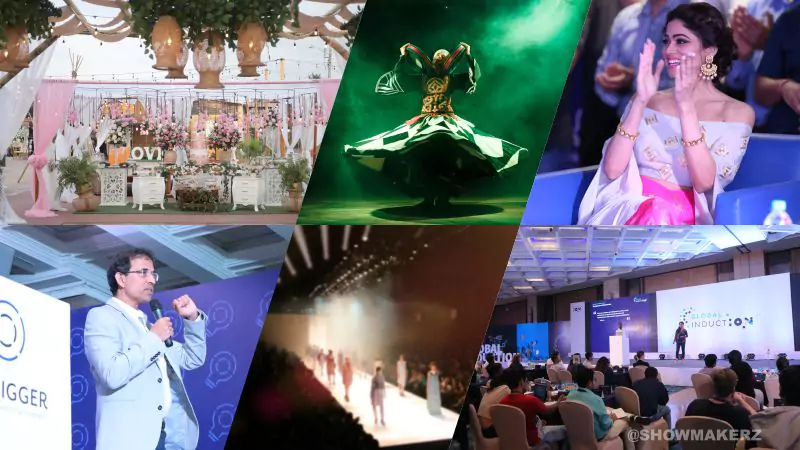Top Event Planning Tips To Plan An Awesome Event
Planning an event is an exciting process but can be very stressful, if any small thing is slipping away or not timely planned.Like any other business, event management is also a planned and organized process. Memorable events don’t just happen. Organizing and holding an event takes planning. Whether it’s a conference, dealers meet or a employees appreciation day, and whether you have three weeks to plan or an entire year, your event’s success is in the details.
We’ve collected top 10 tips for corporate event planning & management which will help you to master the fine art of planning a memorable and awesome event.
1. Begin early
Begin planning as soon as you possibly can. If your event is a large event you should realistically begin planning it three to four months in advance. Smaller events need at least one month to plan.To keep the final run up to the event flowing smoothly, try to prepare a checklist as soon as possible and start freezing the things one by one effectively.
2. Decide upon your target audience
Next important thing is to define who your target audience is. From this all the other decisions will fall into place. Format, content, prices, location, etc. will all flow from the first decision.This structured approach will also help you to stay focused on achieving specific goals. That way you are less likely to allow the scope to become too broad or watered down.
3. Have a clear business purpose for holding the event
Before you can begin planning a successful event, be clear on why you are doing it in the first place. Why? Because every decision after that should support your main goal. Is it lead generation? Is your goal to create strong dealers network or employee engagement? Plan accordingly and set clear and achievable goals.4. Set Your budget
Once you are ready with your checklist, you are in a position to make them reflect in your cost sheet. Analysis each one very meticulously and allocate sizable budget for each head after doing groundwork.Take every deliverable in this sheet, be it venue, entertainment, decor, branding, food & beverages, event licenses, logistic, printing or manpower etc. It's also advisable to have a contingency fund reserve in case of unforeseen situations like rain or any other such issues..
5. Choose a reliable venue
The location of your event can make or break your stress level. Always go for a accessible and approachable venue suitable for your audience size. Venues that provide things like seating, catering, and lighting take the burden off your to-do list.You may also plan for a unconventional venues like joggers park, party bus or metro ride etc.. all depends on your trust with the venue, feasibility and guest size etc.
6. Choose a theme and format
Once you have set your objectives and defined the audience, it's time to choose format and theme for the event. Every event has many possibilities and many limitations simultaneously. Creating a glitch free wonderful event while keeping the traditional format intact and to accommodate exciting opportunities to interact is event manager's job.Always offer opportunities for attendees to do something fun, memorable and entertaining that they wouldn't typically do anywhere or anytime else. This might include hearing from a famous speaker, comedian, or band; playing on an incredible golf course; or trying something new, thrilling, or exclusive for the first time.
7. Start finalizing your vendors
Now when you are set with your other plans like audience size, venue, theme, format & budget, you should start finalizing vendors for your itinerary. Plan a detailed meeting, be ready with all your briefs, layout plan and event flow. Share them with your trusted vendors and make theme fully understand your ideas and expectations.Encourage your vendors to share their ideas and any other latest technology they can offer. Make a proper contract and freeze them one by one. This will off load stress from your shoulders and now you are ready with your technical team.
8. Allocate responsibilities
It is very important to distribute tasks among the team members. Ultimately event management is a team work. Group each of your sub tasks into some major task head. Like food & beverage is one major task consisting many sub heads like selection of menu, buffet set up, service, liquor license, crockery cutlery etc.Delegate Each major head to a team of specialized team members. Give each member of the team a document with the assigned responsibilities, so that every person knows who to contact for any specific issue..
9. Carry out a final check 72 hours before the event
Make sure that you’ve informed the participants of how to get to the location, invited all the important guests, and prepared the printed materials, audio and video contents.Check whether everyone understands his or her tasks and responsibilities and whether the space is ready. If possible try to a mock run 24 hours before the event to check whether everything is in place, working, being done on time.
10 . Event running & backstage management
Pay attention to every service. Every major task manager should be connected wireless with each other to be in constant loop. Make sure that your team follows The Duck Face Rule. Be friendly to participants, speakers and partners. Try to address their problems or questions and meet their expectations, even if you feel tired and not everything runs to plan.At the end of the day, what people remember is how they were treated and the atmosphere not what the speaker was saying on the stage.
If You are looking to organize a successful & spectacular event, We being the best event organiser can help you. Please feel free to call Showmakerz Event Management Company.







